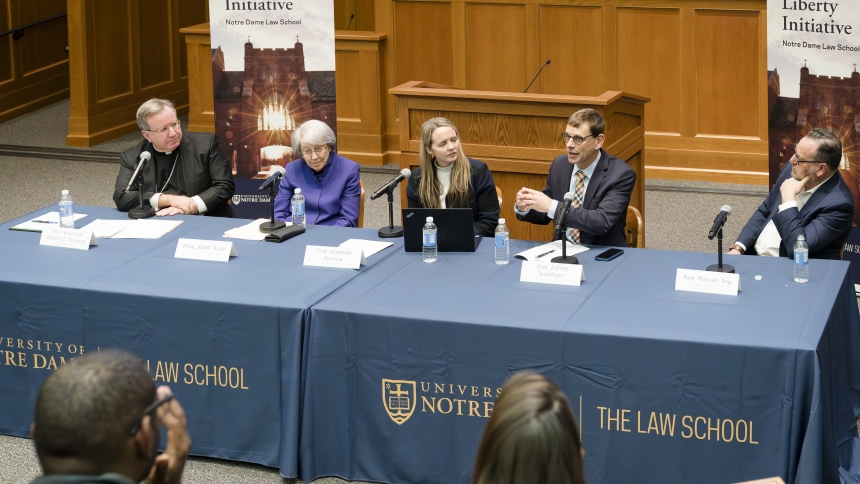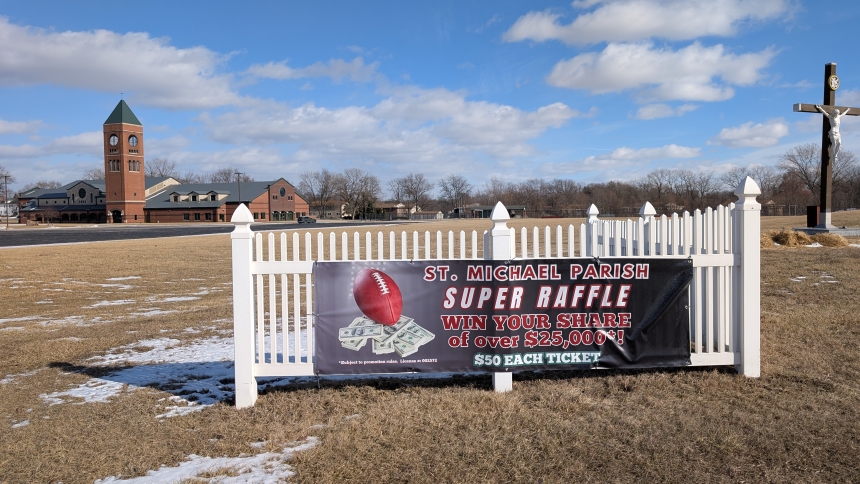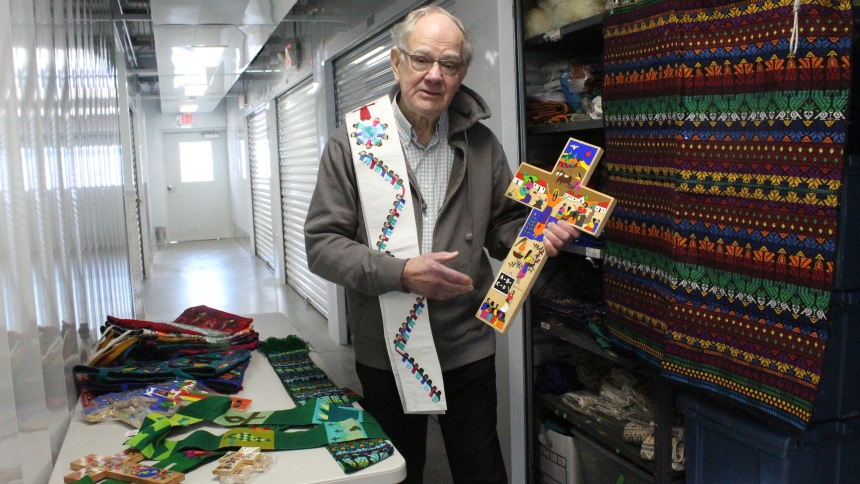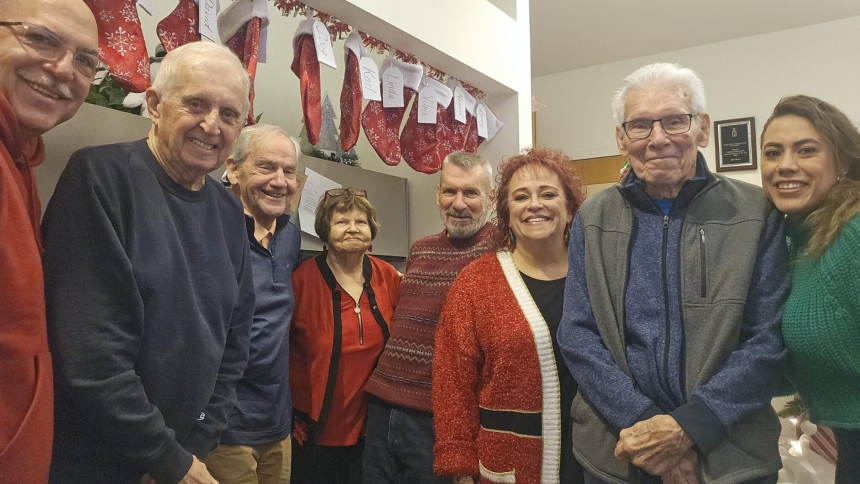
SOUTH BEND – With the number of cases of antisemitism continuing to increase in the country and on the grounds of higher institutions, the Notre Dame Religious Liberty Initiative was motivated to organize an event that would share the facts and history surrounding the topic to better inform students. Among those invited to participate in the event was the Most Reverend Robert J. McClory, Bishop of Gary.
As Dean G. Marcus Cole, Joseph A. Matson Dean and Professor of Law at Notre Dame Law School, welcomed University of Notre Dame students to the Eck Law Building on Nov. 30 for “The Rising Tide of Antisemitism on American Campuses and Beyond,” he noted that he was proud that the conversation was being held on the campus of the University of Notre Dame.
“It’s a discussion that’s not taking place at enough institutions around the world,” he said.
But Cole admitted that he was also saddened and ashamed that in 2023 there was a need to discuss the rise of antisemitism within society. “We’ve made very little progress if this is the case.”
Cole stressed that the discussion was about the rise of antisemitism and would not be a debate about who is right and who is wrong with regard to the war in the Holy Land, nor would it be a debate about the policies of the government of Israel, and added it was also not a two-sided debate.
“There are not two sides to antisemitism in the same way there are not two sides to racism,” Cole said. “And a discussion on antisemitism does not imply that there is no racism or hatred toward other groups. The fact that we are having a discussion about hatred against Jews also does not imply any other form of hatred is acceptable or okay or is beyond our concern.”
During introductory remarks, Professor Avishalom Tor shared how “once America was different.” He reminded the students gathered in the university’s McCartan Courtroom that the country, which promised equal protection to all under the law, was a beacon of hope to persecuted Jews, as it was to many others.
American Jews who cherished what America stood for finally felt they truly belonged, he said, and they wholeheartedly believed that America was different.
That belief, he went on to say, is being shattered by an increase in antisemitic rhetoric and behavior, noting that Jewish cemeteries and institutions have been defaced with swastikas and slurs, there have been attacks on synagogues as well as the premeditated murder and violent kidnapping of 1,000 Israeli civilians on Oct. 7 by Hamas terrorists and the days that followed.
“(A hope of belonging) is shattered by the words and actions of some students, faculties and administrators at our great institutions of higher learning,” said Tor. “It is shattered by the excited crowds joyfully celebrating and glorifying the atrocities and identifying with the perpetrators.”
Keynote speaker Ruth Wisse, Martin Peretz Professor of Yiddish Literature and Comparative Literature Emerita at Harvard University, defined antisemitism as the politics of “pointing the finger.” The “pointing of the finger” makes the Jews the defendants and directs suspicion at them.
Providing a historical context, she detailed how the more recent antisemitism movement began in Germany in the 1870s when the League of Antisemitism set out to show that “what others welcomed as emancipation was really a Jewish plot to conquer Germany from within.” When social problems developed in the mid to late 19th century, antisemitism provided a simple answer.
“You know why you're unemployed? Because the Jews have your jobs. And you know why you’re poor? It’s because the rich Jews have your money,” spoke Wisse.
The explanation worked so well, she said, that officials in Europe began to be elected on platforms of antisemitism, and within 50 years Adolf Hitler became chancellor of Germany in 1933. He set out to organize the Third Reich across Europe where other countries harbored movements that likewise held Jews responsible for the difficulties “that the Jews had neither caused nor could in any way alleviate.”
Why does antisemitism work? Wisse provided several reasons: it provides a simple explanation for what’s going wrong, builds coalitions among otherwise competing factions, and, by pointing the finger, deflects from the motives of the accusers.
The idea that Jews are a corrupting people has a long history in other cultures with Christianity and Islam, according to Wisse, but each iteration tries to distinguish itself from the one before, so antisemitism insisted it was different from the religious anti-Judaism that had preceded it, just as anti-Zionism distinguished itself from antisemitism.
“I think we owe it to the demonstrators to see what they are applauding,” she said. “Let’s not wait to build new wings to the Holocaust Museum.”
Wisse then participated in a panel discussion alongside Ken Marcus, Esq., chairman of the Louis D. Brandeis Center for Human Rights Under Law; Professor Jeffrey Veidlinger, Joseph Brodsky Collegiate Professor of History and Judaic Studies at the University of Michigan and Bishop McClory.
Bishop McClory said he remembered wanting to look away from the images of Oct. 7 because it was so disturbing and jarring. But he said, “One couldn’t look away. One couldn’t just pause or fast forward. One had to acknowledge that what Hamas did to the Jews was evil. It is beyond disappointing that we can’t just stop and say that.”
“It was evil, and we need to declare it as such,” he said. “Even if we can’t personally erase and undo and correct that evil. To declare something as evil, (Catholics) believe is a spiritual work of mercy. It’s admonishing the sinner; it's saying that it is wrong.”
The bishop referenced Nostra Aetate “In Our Time,” a document developed during the Second Vatican Council that stated, “the Church, mindful of the patrimony she shares with the Jews and moved not by political reasons but by the Gospel’s spiritual love, decries hatred, persecutions, displays of anti-Semitism, directed against Jews at any time and by anyone.”
“I needed to be here because I didn’t want this horror to go unacknowledged and fail to stand in solidarity with Jewish brothers and sisters,” said Bishop McClory.
Marcus said it should be shocking that the response to atrocities would not be a realization of the problem and a desire to confront antisemitism, but rather an explosion of additional incidents.
He confirmed that the Louis D. Brandeis Center has seen record levels of antisemitism recently in the country and especially on college campuses. He said there was strong data in its anecdotal information that “it’s never been so bad,” and shared the fact that the center has received a significant increase in cases.
“Sure, there is more public awareness (of antisemitism) but that does not explain the more than 10-fold increase of what we are seeing,” he said.
The character of antisemitism seen on college campuses has changed over the past 20 years and the evolution has heightened in recent months and weeks. There was a time when the center primarily tracked and responded to campuses in which antisemitic and anti-Zionist language in lectures, public events and rallies created a toxic environment for Jewish students.
“Within the last couple of semesters, we’ve seen a significant increase in cases in which individual Jewish students are targeted for some form of marginalization or exclusion,” said Marcus.
As the discussion turned to talk of possible solutions, Veidlinger said he believes education is one important aspect of fighting antisemitism. He encouraged any student or person who is curious or concerned “to actually learn more about the situation and about the Middle East in order to discuss it.”
“Where I think the problem comes in is when people project all of the problems the rest of the world is facing onto Israel,” he said.
Bishop McClory drew attention to the importance of understanding and taking time to build relationships among groups of people. Friendships matter, he said, so when a crisis hits the relationship is already there and it becomes easier to reach out.
“If I have a sign of hope to share it’s that relationships matter, getting to know (more about a situation) from the other perspective matters, and then standing with each other in moments of solidarity matters,” the bishop said. “Hearing and reminding ourselves of those histories can serve as a valuable tool so that others of us who might otherwise have blind spots, have our eyes more widely open.”



